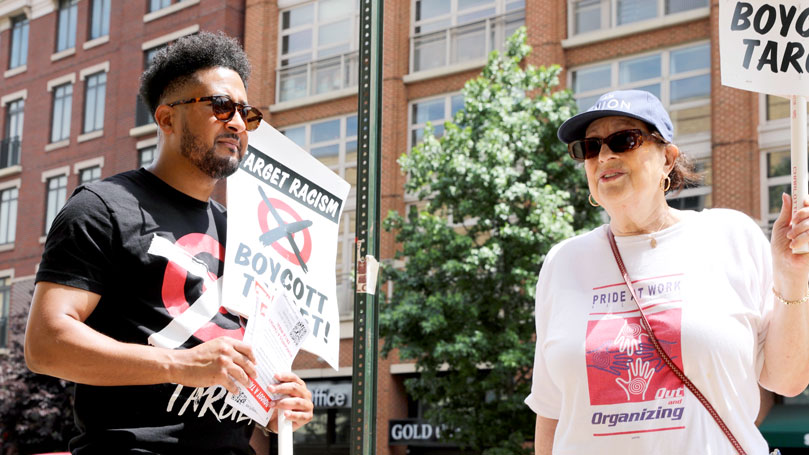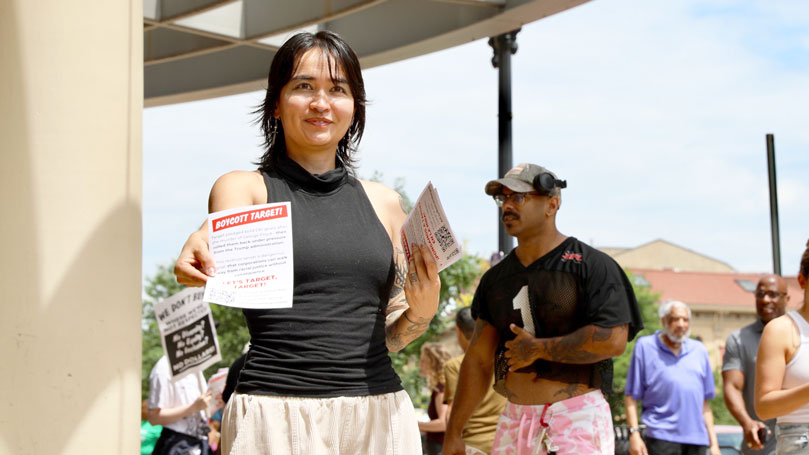
Take the pledge: boycott Target!
In a recent decision, the National Board of the CPUSA endorsed the boycott of Target Stores in solidarity with those faith and community leaders who initiated the boycott. The African American Equality Commission provided this background on the campaign.
How we got here
After the police murder of George Floyd in May of 2020, Target (whose headquarters are in Minneapolis, MN), was one of the first major corporations to invest into diversity, equity, and inclusion (DEI) programs. They committed $2 billion to support Black-owned businesses and another $100 million to support Black communities and Black representation in leadership roles. It additionally pledged to add products from 500 Black entrepreneurs to its shelves and to direct $100 million into Black scholarships and non-profit organizations for HBCU students.
A conservative and anti-LGBTQ-led boycott was launched against Target in 2023 for selling Pride merchandise. This led to general attacks on Target executives and its workers for the company’s DEI policies at the time.
After the inauguration of Trump in 2025, Target was one of the first major companies to scale back its DEI initiatives, following an effort by a MAGA-faction of shareholders pushing anti-DEI resolutions at several major companies which were rejected by the likes of Apple, Costco, Coca-Cola, Levi’s, and others. The Target memo stated that the company would end its three-year DEI goals, stop reports to diversity-focused groups, and end its programs focused on carrying more products from Black and minority-owned businesses.
Significance of DEI
DEI initiatives have similar objectives and goals to affirmative action programs from decades earlier, but they are not identical. DEI was not a primary demand of the George Floyd rebellion and Black Lives Matter movement. It was a corporate and mainstream response to the uprising in general. Major corporations began investing in DEI and made promises to address discrimination in their workplaces, change hiring practices, use more African American and other minority branding in their advertising efforts, and promote more small minority-owned vendors.
These initiatives came with a lot of criticism from people in radical movements because it was a “band-aid” on broader problems regarding questions of racist wage gaps, promotions, unemployment, and more (though, the application of DEI was and is not homogeneous across all corporations). In addition, a lot of these private corporations were anti-union while “pro-DEI” publicly in an effort to divide the working class and increase their profits. However, on the general question of democracy, these programs aimed to address some of the questions of equality within the workplace, which is a necessary component in the fight for socialism.
Response from the African American community and others
On February 1, the beginning of Black History Month, a group of African Americans in Minneapolis, MN — including civil rights lawyer Nekima Levy Armstrong, Black Lives Matter MN co-founder Monique Collars-Duty, and Jaylani Hussein of CAIR-MN — called for a nationwide and indefinite boycott of Target. The call received some initial resistance from Black vendors who had their products on the shelves of Target. Some of these called instead for a “clearing of the shelves” rather than boycotting, to support the Black entrepreneurs. Twin Cities Pride dropped Target as a partner and corporate sponsor of its parade following the boycott call.
A national boycott call by former Ohio State Senator Nina Turner of We Are Somebody and Tamika Mallory of Until Freedom also became public on February 1, primarily through social media, noting that Target had also contributed $1 million to Trump’s inauguration (a first for the company). They called on their supporters to buy from Black-owned brands directly at their websites or at other stores outside of Target. Sen. Turner has also pointed out that the CEO of Target makes 719 times the median pay of Target workers.
As a result of these initiatives, Pastor Jamal Bryant out of Atlanta, Ga., called for a 40-day Target fast from Ash Wednesday, March 5 through Easter Sunday, April 17. The Latino Freeze Movement also joined in on the call to boycott Target because of its DEI rollback.

Following these initiatives, Target’s foot traffic has fallen significantly. In the four weeks ending Feb. 9, there were 5 million fewer shopping trips at Target compared with the year before, while Costco’s traffic increased. Target CEO Brian Cornell’s compensation declined 45%, and the company’s share value fell by more than 30%. After its Q1 earnings came out recently, Target cut its full-year sales outlook.
On March 29, a coalition of Black clergy in Washington, D.C. and some community partners — including the local club of the Communist Party USA, the D.C. Poor People’s Campaign, and the new DMV chapter of the Dream Defenders — have participated in a weekly informational picket in front of the busiest Target in the city’s Columbia Heights neighborhood. The coalition hands out nearly 500 leaflets over a 1 hour period in addition to ringing out protest songs and picketing. The weekly action has been covered in the local African American newspaper, the Washington Informer and People’s World. The coalition is looking to expand with participation from Black Greek organizations, civil rights organizations (like the Urban League and NAACP), and other spaces of worship. This coalition is looking to expand to an additional location in Prince George’s County, which has a large density of African Americans.
At the conclusion of the Target fast on Easter Sunday, Pastor Jamal Bryant announced that the fast will turn into a full-on boycott. He hosted a national town hall some days afterward featuring leaders in Black Press Associates (Rev. Ben Chavis), the Black Chamber of Commerce, Tamika Mallory, and Nina Turner, announcing a national organizing committee of the boycott. This town hall put forward four demands on Target in order for the boycott to be lifted:
- Honor $2 billion pledge to the Black business community
- Deposit $250 million across 23 Black-owned banks
- Establish community retail centers at 10 HBCUs
- Fully restore and recommit to DEI.
The following action was on May 25, where Rev. Bryant called on faith leaders to lead a prayer vigil at a local Target store for 9 min. 40 secs, the amount of time that the racist cop Derek Chauvin kneeled on George Floyd’s neck in 2020.
Why should clubs and districts take this project on?
The CPUSA has expressed its support for the boycott before. A graphic promoting the boycott was released on social media and party co-chair Joe Sims published a statement on why we are supporting the boycott. A recent meeting of the National Board agreed to encourage clubs and districts to take the project on.
Consumer boycotts have a long history in the African American community, as well as in the labor movement. As detailed in the People’s World article, “The emerging people’s boycott movement against MAGA,” these include the role of the National Negro Congress and the African American community in Harlem boycotting a private bus company, demanding they hire more Black workers. Later, there was the well-known Montgomery Bus Boycott, which lasted nearly a year and brought Rosa Parks and Martin Luther King, Jr. into the national spotlight. Later, during the affirmative action period of the 1970s and ’80s, Rev. Jesse Jackson of Operation PUSH led boycotts against Coca-Cola, CBS, and other big businesses for not instituting affirmative action programs in their workplaces.
Concentrated boycotts have proven successful — including those of the Free South Africa movement and even recently with the Teamsters in Texas fighting for a contract with Molson Coors. One can also look to the #TeslaTakedown efforts taking place around the country in response to the Musk and DOGE-led attacks on our public services and public sector workforce, which ultimately forced Tesla’s shareholders to push out Musk from his public-facing role in the Trump government. The BDS movement has also had an impact, undermining the profits of targeted companies like Carrefour, Elbit systems, and McDonald’s; forcing various corporations, universities, and local, state, and national governments to separate ties from the Israeli occupation of Palestine; and creating economic distress within Israel.
The National Board agreed to redouble our efforts to support the Target boycott, providing materials to assist clubs and encouraging club leaders to work with coalition partners like progressive Black clergy, Poor People’s Campaign, NAACP, Urban League, Black Greek organizations, local Black leaders, Black Lives Matter chapters, and Rainbow PUSH, as well as Latino, Asian American, and Women’s and LGBTQ organizations.
Take the pledge: boycott Target!
Further reading and resources:
The emerging people’s boycott movement against MAGA
D.C. Black clergy join growing boycott of Target
Local Target Protest to Soon Reach One-Month Milestone
Black Power Rising: Target Faces Renewed Boycott
Faith Strategies’ target Target campaign
targetfast.org
Images: People in D.C. build support for the Target boycott (Kristine Jones Photography / @3women4craft2market)


 Join Now
Join Now